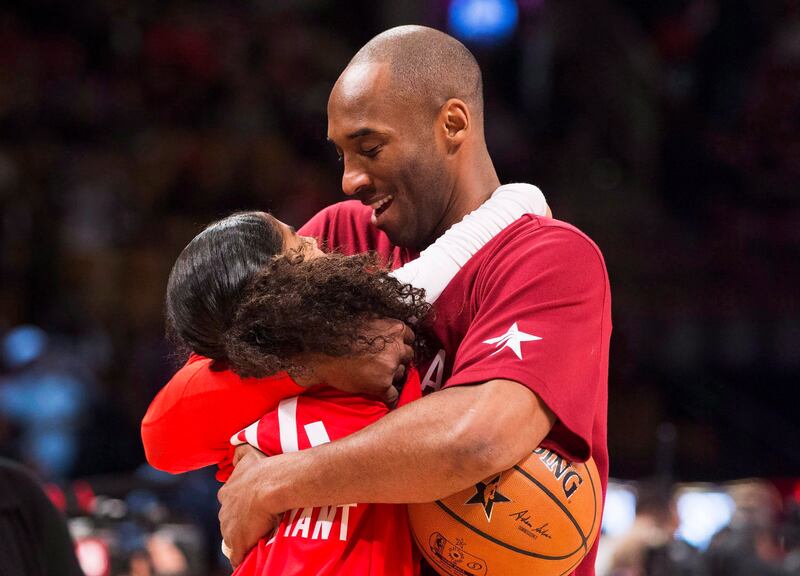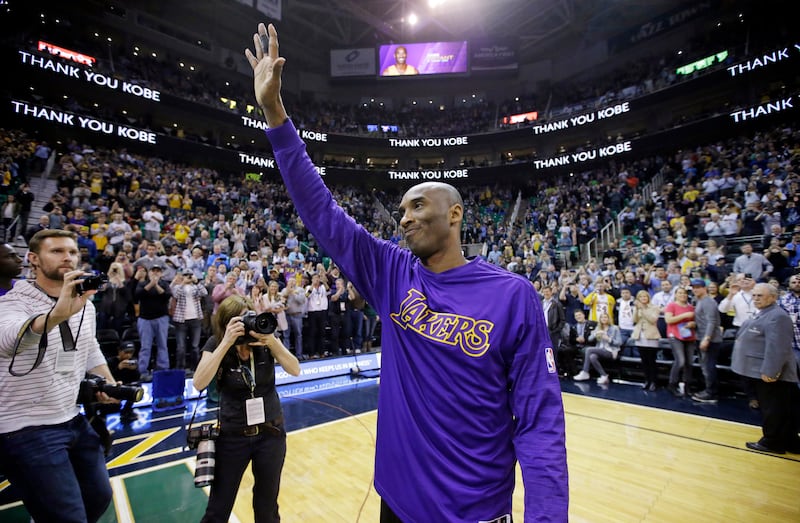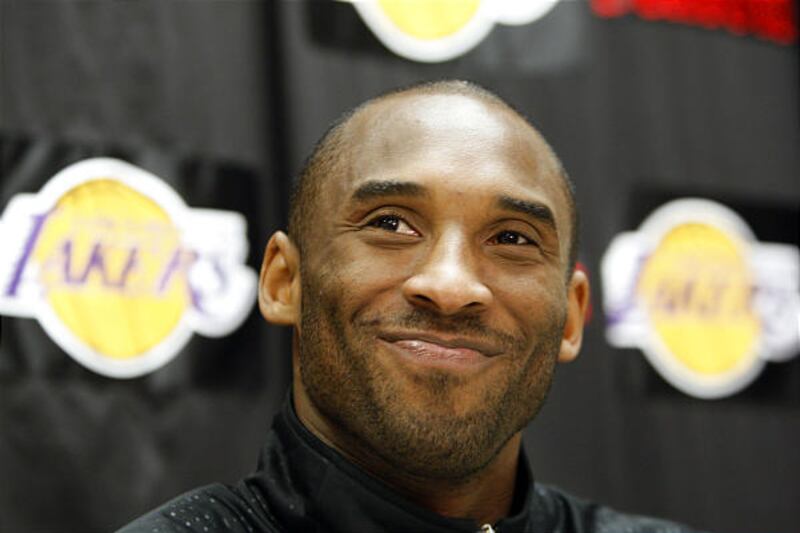SALT LAKE CITY — “Please don’t let it be true.” I’d just parked myself at an empty table in a downtown cafe when I saw the first tweet. Don’t let what be true? I wondered as I searched out a fork. The thought vanished momentarily, but with a chicken finger in one hand and my phone in the other, I opened Twitter again: “Kobe Bryant dead —”
I paused midchew, along with the rest of the sports world, choking on those three words. Indeed, when the news of Kobe’s death broke, it functioned almost like a pause button. So sudden, so unexpected, so shocking that it jolted anyone with a remote interest in sports into immediate grief, pulled them from anything else they might be reading or watching and glued them to this moment and this man. Terms like “heartbreak” and “shock” couldn’t capture the gravity, but as they poured in from every corner of the internet, their collective weight did.
Bryant’s death in a helicopter crash Sunday morning sent viral dread across social media. After the initial report from TMZ and confirmation from a local ABC affiliate, fans constantly refreshed their feeds, hoping the reports were just false rumors. But when ESPN’s Adrian Wojnarowski confirmed the news, denial gave way to numbness. Unfeeling, unresponsive, catatonic numbness.
Then, somehow, the tragedy got worse: Not only did Kobe die at 41 — one of his four daughters, Gianna Bryant, also died in the crash, as did seven others. She was 13.

Kobe started his NBA career a few months after I was born and became one of the most ubiquitous names of my childhood, even though I didn’t pay much attention to basketball. His universality transcended the sport — everybody knew about Kobe. This was true for most of my friends, all of us in our early-to-mid 20s, but also for teenagers who never even saw Kobe in his prime. My editor’s son, 13, was riding a ski lift at Sundance when the news broke. A man on the ski lift, he said, wept and shouted the announcement to other lift riders, while the kid who was born halfway through Kobe’s career sat in disbelief.
Whether on a ski lift, in a coffee shop or at a church Sunday morning/afternoon, you may have experienced something similar. You may have looked around and recognized people looking at their phones with unusual intensity, talking to their friends with unusual seriousness, processing their grief along with you.
This was sports at its most powerful and most infuriating, uniting people in a way few events can, around something that was never supposed to happen. To anyone, but especially not to someone like Kobe. During his 20-year NBA career with the Lakers, Kobe became something like a demigod, larger than life on and off the court.
Kobe was ingrained in the social experience: People learned to love basketball because of him. People learned to approach life his way — the Mamba way. A generation yelped his name when tossing crumpled papers into the trash — a tradition that will never be the same. That’s what made it so hard — why the man personally known to so few caused physiological symptoms in so many. Because it felt like you knew him. And the first thing you knew was that he appeared invincible.
“Terrible things happen every day, but when someone like Kobe — who seemed so untouchable, so omnipresent and larger than life — is taken away,” Sports Illustrated’s Charlotte Wilder wrote on Twitter, “it really drives home how absolutely nothing is guaranteed and our time here is pretty precious.”
This is the burden of sports: Those few moments when the athletes who made you think anything was possible remind you that death is messy and unpredictable, and impossible to avoid. I must confess that I didn’t grow up a fan of Kobe, or even of the NBA. But only once prior to Sunday can I recall a similar feeling: Back in September 2016, when 24-year-old Miami Marlins pitcher Jose Fernandez died in a boating accident.

“It is the worst kind of awful, young life extinguished with thudding finality before it can really be lived,” Dan Le Batard wrote for the Miami Herald at the time, “but it is somehow made harder because it was this life.”
I remember where I was — driving down I-75 somewhere in north Georgia, after covering the Florida-Tennessee football game — when I learned about Fernandez’s death. I first denied it. Jose Fernandez is a common name in Miami, I thought, and this must just be a terrible mistake. Then I cursed it. How could this happen to someone so young, so talented, so gregarious and uplifting and inspiring? And then I talked about it. With my girlfriend, parents, friends and co-workers, who all wrestled with the same questions, the same grief.
Fernandez was no Kobe. He was a candle extinguished before it burned brightest; Kobe was a raging campfire doused by a five-gallon bucket, never to know the afterglow. But Le Batard’s second observation — that what makes it so painful is who he was — is relevant. Every helicopter crash or plane crash or car crash or shooting or drug overdose could be a reminder that life is precious; that we should “smell the flowers” and avoid taking life for granted. But most deaths don’t have that effect.
Beyond a sigh and a “that’s too bad” and a “I can’t imagine what that must be like,” most deaths remain abstract. But deaths like these are somehow more personal. They force you to imagine what dying might be like, because if it can happen to Kobe, or Jose, it can definitely happen to you. A fact that’s obvious, but one that’s rarely wrestled with, that’s easy to put out of mind, save for moments like this one.
Someone who isn’t a sports or basketball fan might reasonably ask what makes this so sad. Again, people dying for no reason happens daily, hourly. And Kobe’s legacy was complicated. The answer is: It’s not every day that a person who embodied adjectives like invulnerable, indestructible and relentless ceases to exist, at 41 years old, leaving behind a wife and three daughters. And it’s not like he was Muhammad Ali, whose transcendence surpassed even Kobe’s but whose death, at 74 following a decadeslong bout with Parkinson’s syndrome, was almost welcome relief.
So complicated or not, it hurts, because it forces a reckoning about how little control we have. If Kobe can go so young, anyone can.
“You can, of course, mourn imperfect people,” Bleacher Report’s David Gardner tweeted, along with an observation about the gravity of the moment: “Today a generation of sports fans stares into the abyss together, many for the very first time.”
I know he’s right, because even though I didn’t know much about Kobe, I stared into that abyss. So did my friends: “Dude,” one wrote, unprompted, “I’ve never felt so shocked by a death.” Another, who grew up across the world in Singapore, wrote that before he ever played basketball, he knew who Kobe was. Like me, he isn’t a huge NBA fan, but nevertheless added that of all celebrity deaths in his lifetime, “I must say this one hits me the hardest.” And my girlfriend, who has never voluntarily watched a basketball game in her life, passed along a video of Kobe speaking Spanish captioned “This is just too sad. I can’t believe he’s gone.”
As Gardner said, this was about starting into that abyss together.
Sports Illustrated’s Gary Smith once called Sept. 11 “the day America mourned”; this wasn’t that extreme, to be sure, nor did it carry the same kind of implications. But it did unify people in a rare way, forcing them to confront an uncomfortable, unavoidable reality as one. I’m only 23, so my frame of reference is limited, but this is the first time in my life I can remember one event causing such collective sympathy and reflection. It was, more than Jordan’s retirement or the death of Len Bias, the day basketball mourned.

The pause will dissipate in the coming days, if it hasn’t already, and life will resume at full speed with the latest impeachment rumblings or excitement about the Super Bowl or something ablaze on the stove. Even something this shocking can only hold the collective attention for so long. But perhaps its lessons — about mortality, uncertainty and the abrupt halt caused by their combination — will endure, right alongside Kobe’s contributions to the game.


